Public Health: We encourage moviegoers to wear a face mask while indoors, and as required by the venues that we work with.
For current details of each screening venue’s public health requirements, visit the websites of the venues listed below.
Our screenings are held at multiple venues around Chicago. This season you can find us at:
• The Music Box Theatre
3733 N Southport Ave — Directions • Parking • Covid Policies
Tickets: $10 – $14
• The Auditorium at Northeastern Illinois University (NEIU) (inside of Building E)
3701 W Bryn Mawr Ave — Directions • Campus Map • Covid Policies
Tickets: $10
Want to attend our screenings but having financial hardships? Contact info@chicagofilmsociety.org
SEASON AT A GLANCE
May & June ▼
Wed 5/11 at 7:30 PM
The Afterlight ………… NEIU
Wed 5/18 at 7:30 PM
Gabriel Over the White House ………… NEIU
Sat 5/21 at 11:30 AM
The Canadian ………… Music Box
Wed 6/8 at 7:30 PM
Used Cars ………… NEIU
Mon 6/13 at 7:00 PM
Stony Island ………… Music Box
Wed 6/22 at 7:30 PM
Sudden Fear ………… NEIU
Thur 6/23 & Sun 6/26 at 7:00 PM
Brainstorm + Here’s Chicago! in 70mm………… Music Box
Wed 6/29 at 7:30 PM
Spawn of the North ………… NEIU
July ▼
Wed 7/6 at 7:30 PM
The Incredible Shrinking Man………… NEIU
Sat 7/9 at 11:30 AM
Hell’s Hinges ………… Music Box
Wed 7/13 at 7:30 PM
Variety ………… NEIU
Mon 7/18 at 7:00 PM
All That Jazz ………… Music Box
Wed 7/20 at 7:30 PM
Twister ………… NEIU
Wed 7/27 at 7:30 PM
The Ladies Man………… NEIU
August ▼
Mon 8/1 at 7:00 PM
Menace II Society ………… Music Box
Sat 8/6 at 11:30 AM
The Marriage Circle ………… Music Box
Wed 8/10 at 7:30 PM
The Green Ray ………… NEIU
Wed 8/17 at 7:30 PM
The Criminal Code ………… NEIU
Wed 8/24 at 7:30 PM
Livin’ Large! ………… NEIU
Wed 8/31 at 7:30 PM
The Trial of Vivienne Ware ………… NEIU
Add the schedule to your google calendar
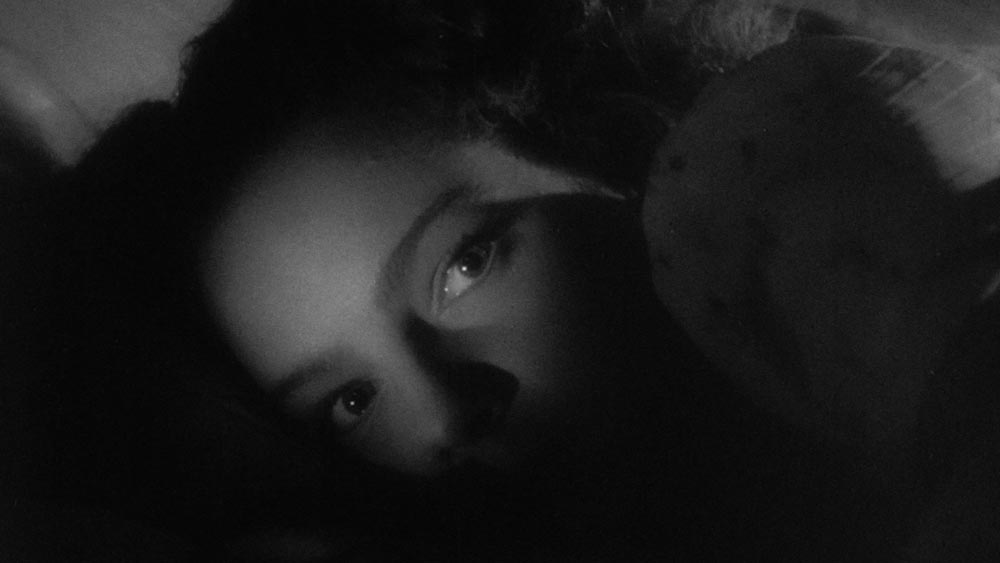
Wednesday, May 11 @ 7:30 PM / NEIU
THE AFTERLIGHT
Directed by Charlie Shackleton • 2021
While preservation efforts headed by archives, studios, and other organizations (including the Chicago Film Society) have made it so certain films can continue to circulate on film after their original print runs have crumbled to dust, an unconscionable number of others have disappeared altogether, taking with them perhaps the only images of people and places long ago vanished. The latest by nonfiction filmmaker Charlie Shackleton, The Afterlight pulls together clips from hundreds of films with a single uniting quality: the people in them have all died. An elegiac archival hangout session, The Afterlight sees Hollywood A-listers rubbing shoulders with unknown bit players, underscoring with its bewitching editing rhythms and dreamy soundscape how all things will one day be lost to time. This includes The Afterlight itself, which Shackleton has purposefully deleted all video copies of and currently only exists as a single 35mm print fated to suffer scratches, splices, broken perfs, burned frames, and myriad other forms of damage until it one day joins Murnau’s The 4 Devils and Naruse’s The Strength of a Mustache as one of the innumerable films gone forever. (CW)
Featuring director Charlie Shackleton in person.
82 min • 35mm from the filmmaker
Preceded by: “Mr. Bean Goes to a Première.” (Paul Weiland, 1991) – 6 min – 35mm from Chicago Film Society collections, selected by Charlie Shackleton
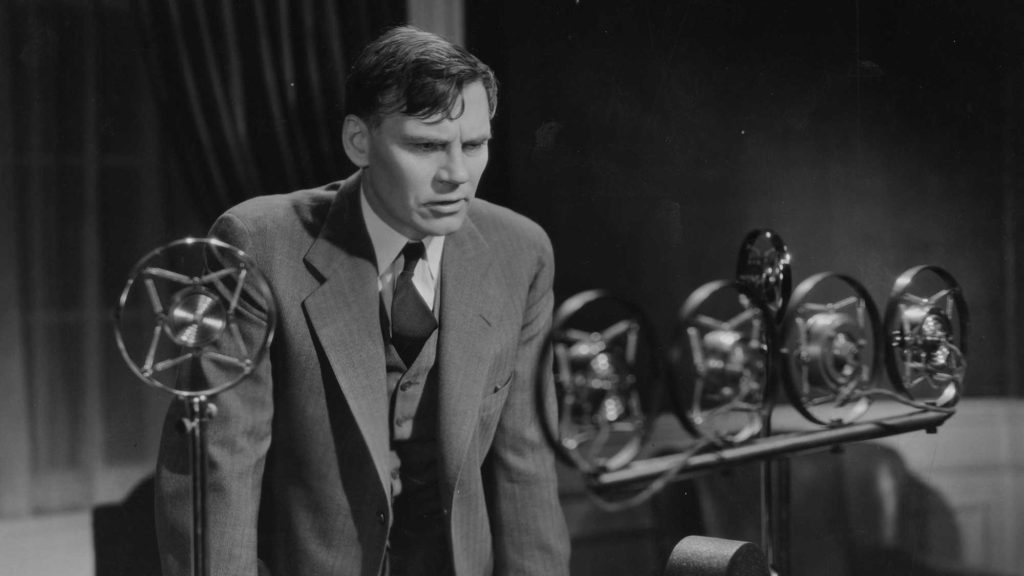
Wednesday, May 18 @ 7:30 PM / NEIU
GABRIEL OVER THE WHITE HOUSE
Directed by Gregory LaCava • 1933
A good many Hollywood artists have tried to take a hand in the politics of their day through the vehicle of cinema. Most of the movies we’ve gotten out of this have been the likes of The Green Berets or Don’t Look Up, starkly ideological films that are swiftly forgotten with negligible effect on policy. Gabriel Over the White House presents a much stranger case. Walter Huston stars as Judd Hammond, an amiable bachelor without any strong political convictions who has just been elected President of the United States. Hammond’s early days in office are spent glad-handing, canoodling with his younger mistress (Karen Morley), and smearing labor activists, but a near-fatal car accident and a deathbed encounter with a divine visitor change the course of his career. Hammond awakens with a sweeping new vision for bringing peace and prosperity to America and the world. All that’s required is unilaterally ending democracy and transforming the USA into a military dictatorship. Rushed into production to coincide with Roosevelt’s 1933 inauguration at the behest of FDR-booster and congressional wash-out William Randolph Hearst (living out his own power fantasies as the uncredited co-writer for Hammond’s speeches), Gabriel Over the White House found little political currency at the time of its release, equally offending progressive critics discomfited by the film’s sunny take on fascism and hardline Hoover-supporting Republicans like Louis B. Mayer, head of the film’s distributor M-G-M. (FDR loved it at least.) As propaganda, Gabriel Over the White House is far too incoherent to ever work, but as art about politics it’s perfect: a bleary, stylish fantasy that’s every bit as fraught and confused as the American political system itself. (CW)
86 min • Cosmopolitan Productions • 35mm from Library of Congress, permission Swank
Preceded by: Political Trailer Reel – 35mm – 10 min
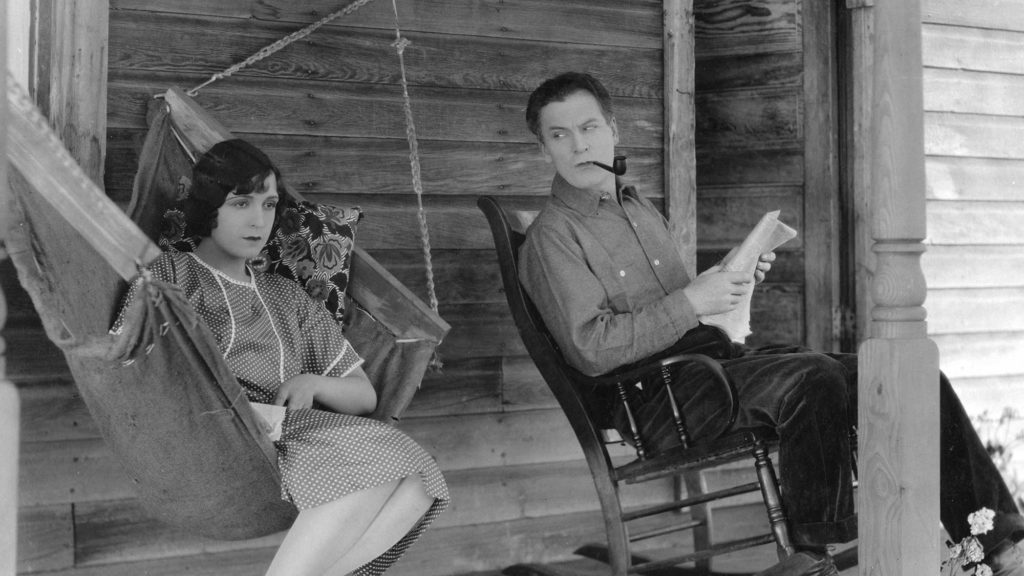
Saturday, May 21 @ 11:30 AM / Music Box
THE CANADIAN
Directed by William Beaudine • 1926
Adapted from a play by W. Somerset Maugham, The Canadian stands as an adult anomaly, a stark tale of frontier life and marital discord that incongruously occupied the same Paramount Pictures release slate that was dominated by flapper frivolities like Mantrap and Love ‘Em and Leave ‘Em. Thomas Meighan stars as Frank Taylor, a tenant farmer in the wheat fields of Alberta who longs for a wife to help him keep house. Enter Nora (Mona Palma), the cosmopolitan sister of Frank’s employer, Ed Marsh (Wyndham Standing). She’s been to London and Paris, but can’t catch a break on the farm and impulsively decides to marry Frank to escape living under the same roof with Ed’s wife. Alas, no arrangement can be so simple. An intimate and mature human drama photographed on location outside of Calgary by Cecil B. DeMille’s regular cameraman Alvin Wyckoff, The Canadian received a critical reception as chilly as its setting, with many reviewers finding it uneventful and lacking in spectacle. (Motion Picture News described it as ”much better than it sounds”—and that was one of the more positive notices!) But latter-day appraisals have been much kinder, not least from director William Beaudine himself. A busy professional with over 400 credits, Beaudine finally got around to seeing The Canadian some four decades after its release and admitted, “I’m very surprised. Why, I was quite a good director in spots.” (KW)
88 min • Paramount Pictures • 35mm from Library of Congress
Live musical accompaniment by Dennis Scott
Preceded by: “Blackhawk Railroad Series: On the Canadian National” – 10 min – 16mm
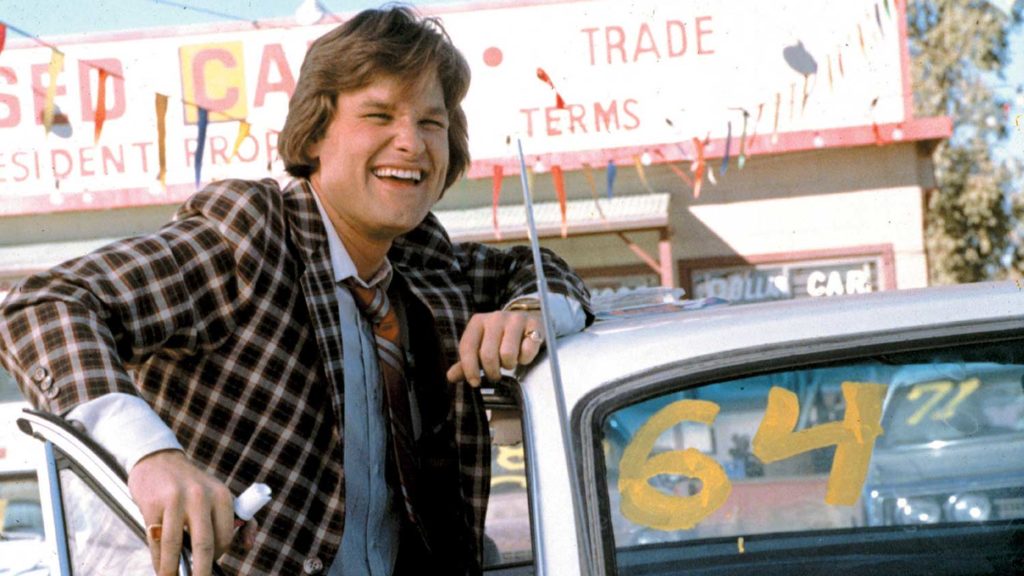
Wednesday, June 8 @ 7:30 PM / NEIU
USED CARS
Directed by Robert Zemeckis • 1980
Used Cars is a horrifying and completely thrilling account of two rival car lots in Mesa, Arizona, owned by the estranged Fuchs brothers: Roy L. Fuchs’s Pre-Owned Car Lot is more successful, Luke Fuchs’s New Deal Car Lot is more scrappy. Kurt Russell works for New Deal and is determined to turn business around, in part because he has to raise money for his poorly thought-out run for State Senator. Russell hires strippers to lure in customers and hacks into local TV broadcasts to get free ad time; Roy Fuchs counters with nothing less than murder, slander, and property damage. The second film by writer-director team Bob Gale and Robert Zemeckis, Used Cars plays like a Three Stooges short with very high production values, culminating in a technically sophisticated action sequence involving 250 driver’s ed students careening across the desert in junk cars. The jokes are tasteless, the salesmen are rude, but as Dave Kehr, a champion of Zemeckis’s work, wrote: “For once a comedy in the Animal House school knows what it’s about: the vulgarity of the gags matches the vulgarity of the subject, and [Used Cars] becomes a fierce, cathartically funny celebration of the low, the cheap, the venal—in short, America.” Preceded by the particularly excellent short subject “Kicking Tires is Not Enough,” an educational film on the dangers of predatory used car salesmen as experienced by teens of the 1970s. (JA)
113 min • Columbia Pictures • 35mm from Sony Pictures Repertory
Preceded by: “Kicking Tires is Not Enough (Or, How to Buy a Used Car)” (Consumers Union, 1975) – 17 min – 16mm from Chicago Film Society Collections
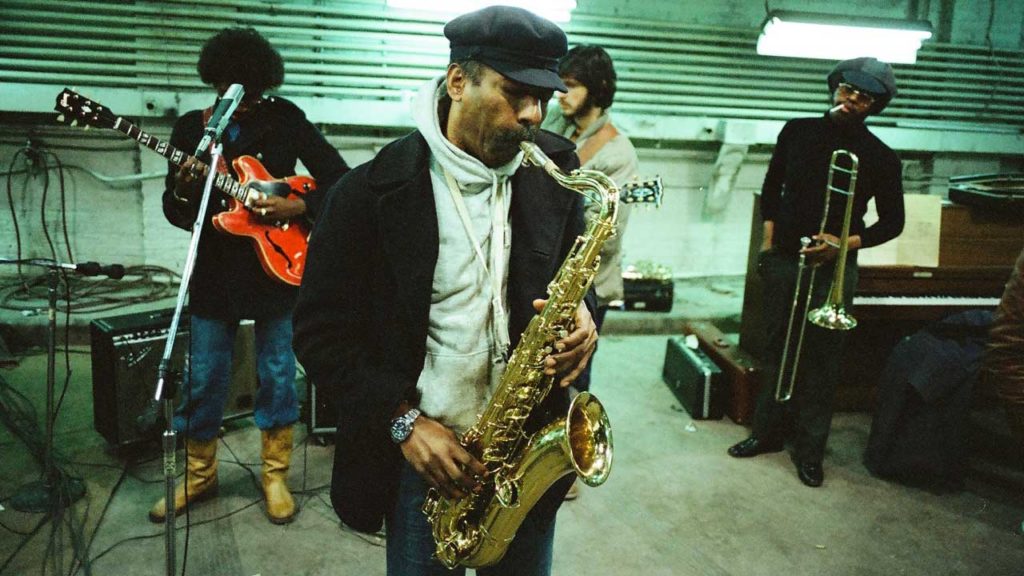
Monday, June 13 @ 7:00 PM / Music Box
STONY ISLAND
Directed by Andrew Davis • 1978
Stony Island, perhaps the only cinematic love letter to Chicago soul music, is also a unique document of the city prior to the formation of the Chicago Film Office, which beginning in 1980 facilitated the production of tourist-friendly Hollywood blockbusters like Ferris Bueller’s Day Off and The Blues Brothers. Independently made Stony Island was a different kind of movie, shot mostly guerrilla-style, capturing scenes of the South Side rarely seen in other films and incorporating vérité footage of landmark places and events (like the funeral procession of Mayor Daley, written into the script after the Boss died during shooting). Directed by a still-young and unknown Andrew Davis (The Fugitive), shot by Tak Fujimoto (who would soon move on to the likes of Melvin and Howard and Silence of the Lambs) and featuring pre-fame appearances from Rae Dawn Chong, Dennis Franz, and Susanna Hoffs, Stony Island channeled the efforts of the rising talents of the time at their freshest. But all of this is burying the lede: this is a music film, and one of the most credible — featuring musicians not only on the soundtrack but in front of the camera, cast in starring roles and recorded doing their thing in numerous rehearsals and dazzling live performances. The film follows the formation of the Stony Island Band, assembled for the production but made up of real-life musicians whose discographies you should dig into if their names aren’t familiar to you: Gene “Daddy G” Barge, Tennyson Stephens, a cameo from Phil Upchurch, and Stoney Robinson as the band’s lead vocalist (and as if the joyous soundtrack provided by the band on screen weren’t enough, James Brown band director David Matthews supplied the film’s nondiegetic score). Tragically, Stoney Robinson died unexpectedly in 1979, just before a planned tour with the Stony Island Band to support the national release of the film and soundtrack album. In the wake, Stony Island‘s lead actor Richie Davis would join forces with Stoney’s brother, Stevie Robinson, to form noted underground soul acts Third Rail and Maxx Traxx. A rare presentation of this local cinema classic on 35mm. (RS)
Co-presented with The Numero Group, with star Richie Davis in person!
95 min • Chicago Pacific Entertainment • 35mm from Chicago Film Archives
Preceded by: Excerpts from “The Chicago Party” (1982), a public access TV program produced by South Side nightclub The CopHerBox II. Only a few years after Stony Island, but breathing the same air, Chicago Party is a dance scene documenting itself, all to promote a south side nightclub. This seven minute short captures a mixture of live performance, dancing, and skits, not quite ready for UHF prime time (but broadcast anyway.) Courtesy of Numero Group.
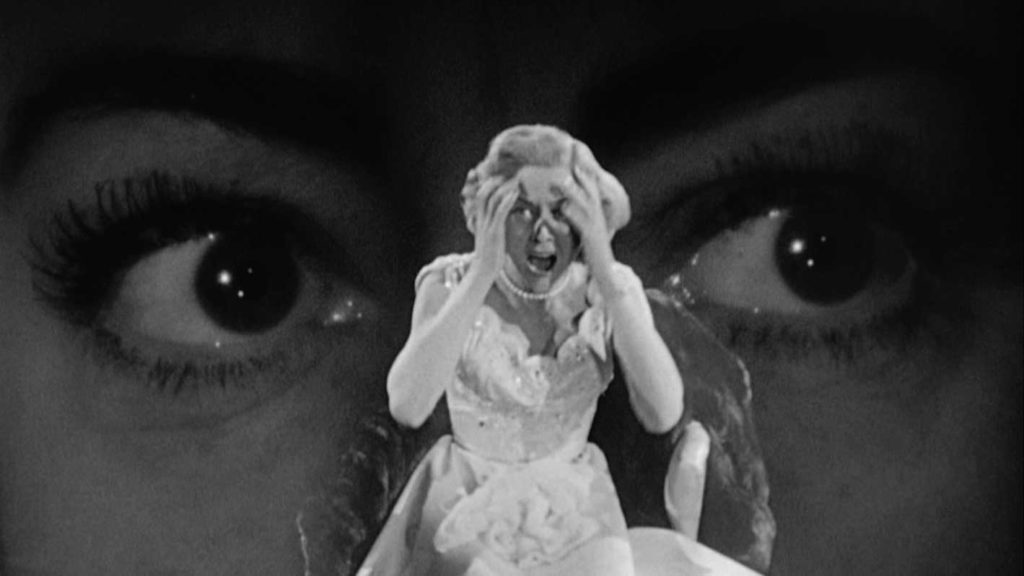
Wednesday, June 22 @ 7:30 PM / NEIU
SUDDEN FEAR
Directed by David Miller • 1952
“I’m crazy about you, I could break your bones.” That’s about as romantic as things get in Sudden Fear, director David Miller’s nasty contribution to the “woman-in-distress” film noir sub-genre. Joan Crawford plays Myra Hudson, a fabulously wealthy middle-aged playwright who has a young actor (Jack Palance) fired from her new production for not being “romantic lead material.” Unfortunately for her, he will come to take the romantic lead — not on stage but in her real life — after a cross-country train ride and several games of poker lead to a whirlwind romance. The ink on the marriage certificate is barely dry when his former squeeze (Gloria Grahame) shows up wanting to know how soon before they can ditch Myra and steal all of her money. The answer she gets from Palance is essentially, “Great question, how about now?” Plans are hatched, plans are foiled, and soon everyone learns that you don’t out-act Joan Crawford, and you definitely don’t outplay her in poker. The film is a real showcase for her range: she swings from a pie-eyed new bride to a calculating manipulator bent on survival — and does it with a sexiness and strength rarely seen in a Hollywood film starring a woman nearing 50. The treacherous plot is well-served by cinematographer Charles Lang’s beautifully lensed San Francisco, with winding streets and panoramic views just begging for a good car chase or an involuntary trip off a steep cliff. (RL)
110 min • RKO Radio Pictures • 35mm from Chicago Film Society Collections, permission Cohen Media
Preceded by: “Hare Trimmed” (Friz Freleng, 1953) – 7 min – 16mm

Thursday, June 23 and Sunday, June 26 @ 7:00 PM / Music Box
BRAINSTORM
Preceded by a new 70mm restoration of HERE’S CHICAGO! THE CITY OF DREAMS
Directed by Douglas Trumbull • 1983
A group of scientists including Christopher Walken, Natalie Wood, and Louise Fletcher invent a brain-computer interface capable of recording and playing back personal experiences and sensations on computer tape, and quickly discover the dangers of playing with memories. The second and final feature directed by Douglas Trumbull, mastermind behind the special effects on 2001: A Space Odyssey and Blade Runner, Brainstorm was initially envisioned as a showcase for Trumbull’s 70mm 60 frames-per-second Showscan system. The version that made it to cinema screens in 1983 — in one of the largest 70mm print runs in history — switches between 35mm (blown up to 70mm and representing real life) and 70mm (representing virtual reality) to great effect, making it a truly unique showcase for the possibilities of 70mm as a format. Overshadowed by Natalie Wood’s untimely death prior to the film’s completion, Brainstorm is a vastly undervalued entry in the 80s sci-fi canon. (JA)
106 min • Metro-Goldwyn-Mayer • 70mm from Chicago Film Society, permission Park Circus
+ + + Showing With + + +
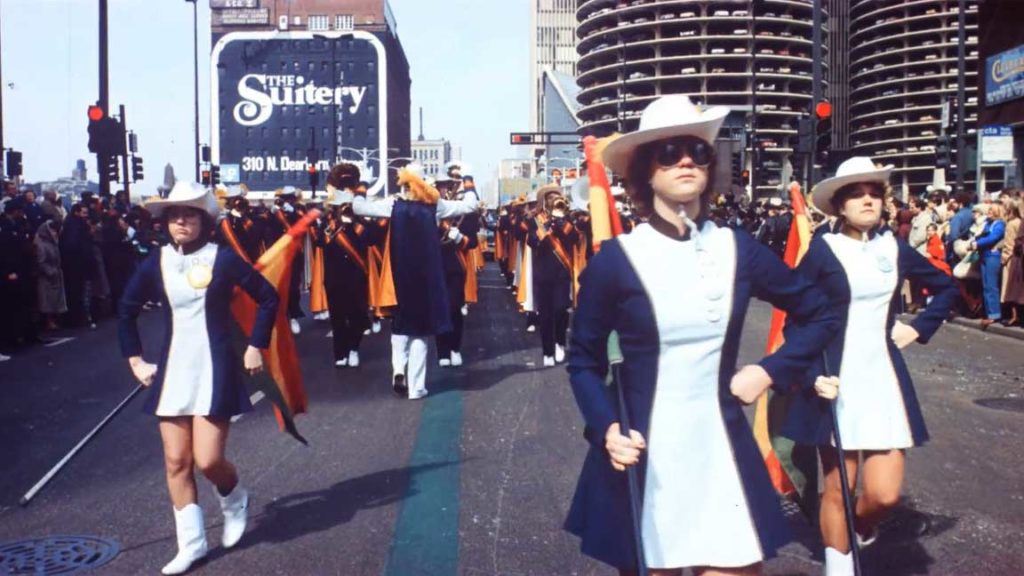
HERE’S CHICAGO! THE CITY OF DREAMS
Directed by Ted Hearne • 1983
The 70mm travelog Here’s Chicago! screened nearly every day at the Water Tower Pumping Station from 1983-1993 as part of the ambitious multimedia tourist attraction of the same name, until the exhibit was closed prematurely in a classic City of Chicago lease dispute. The original negative, along with several thousand feet of footage not used in the finished film, are presumed lost, the equipment used for the exhibit was auctioned off, and the film itself had not been seen until a crusty, oil-stained (but beautiful) 70mm projection print was discovered by CFS in 2016, which served as the source for the new 70mm print screening here. One of only a handful of 70mm short subjects that has received a proper preservation (including the creation of a new 65mm negative), Here’s Chicago! features breathtaking shots of the city by helicopter and “Where’s Waldo” scale opportunities for watching the inhabitants of our great city. Preserved by the Chicago Film Society with funding from the National Film Preservation Foundation. Special thanks to Helge Bernhardt, Nicholas Bergh, Paul Rayton, Mike Quintero, Andrew Oran, and Iver Burke. (JA)
13 min – New 70mm print with DTS sound from Chicago Film Society.
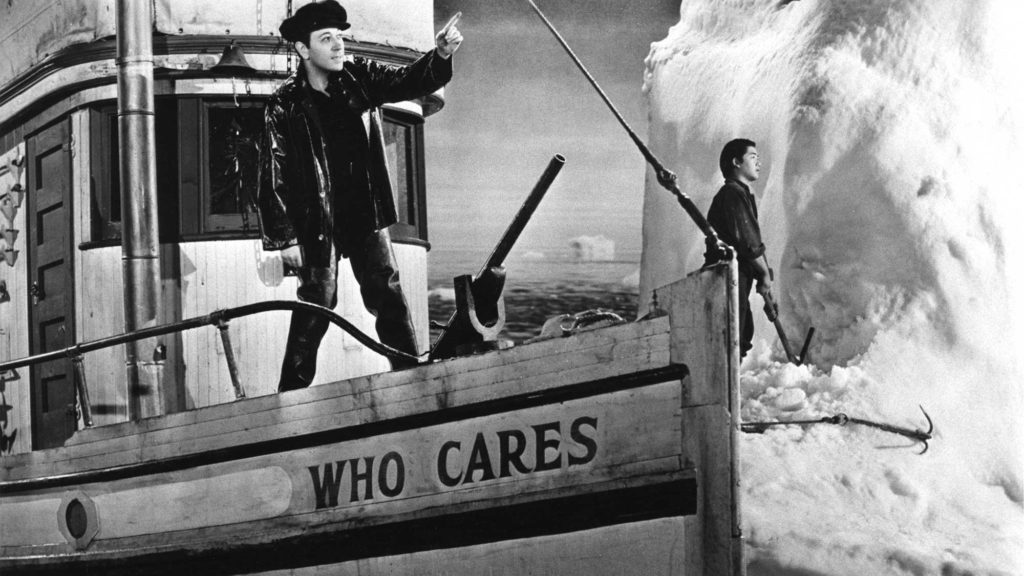
Wednesday, June 29 @ 7:30 PM / NEIU
SPAWN OF THE NORTH
Directed by Henry Hathaway • 1938
George Raft has leased a schooner called “WHO CARES” and sailed around Alaska seeking his fortune. When he finally returns to dry land, he immediately beds hotelier Dorothy Lamour, but not before tossing his pet seal Slicker out the window to the water below for privacy. But Raft’s true love is salmon fisherman and boyhood friend Henry Fonda, with whom he shares a handsy, whistle-worthy bond that makes Spawn of the North about as homoerotic as any Hollywood studio picture in the 1930s. At one point, Lamour hollers to no one in particular that she hopes her boys got dressed, and Raft and Fonda wander out of their room, one arm slung over the other’s shoulder. (“It’s a treat to be kissed, even goodbye,” muses Lamour.) Raft and Fonda’s rough love is the lifeblood of the movie, though it will be tested by betrayals, bullets, harpoons, and Russian fish thief Akim Tamiroff. A brawny, bawdy action picture, Spawn of the North is effectively a cattlemen vs. ranchers Western transplanted to the Frozen North — and to surprisingly tender effect. Following the success of Henry Hathaway’s The Trail of the Lonesome Pine, Spawn of the North was originally announced as a Technicolor epic starring Cary Grant, Randolph Scott, and Carole Lombard. When the eventual black & white Raft-Fonda-Lamour version slinked into theaters two years later, Hollywood was a markedly less confident town, shaken by a season of anemic attendance, but Spawn of the North proved with a vengeance that “Motion Pictures Are Your Best Entertainment.” (KW)
110 min • Paramount Pictures • 35mm from Universal
Preceded by: “The Legend of Rockabye Point” (Tex Avery, 1955) – 6 min – 16mm
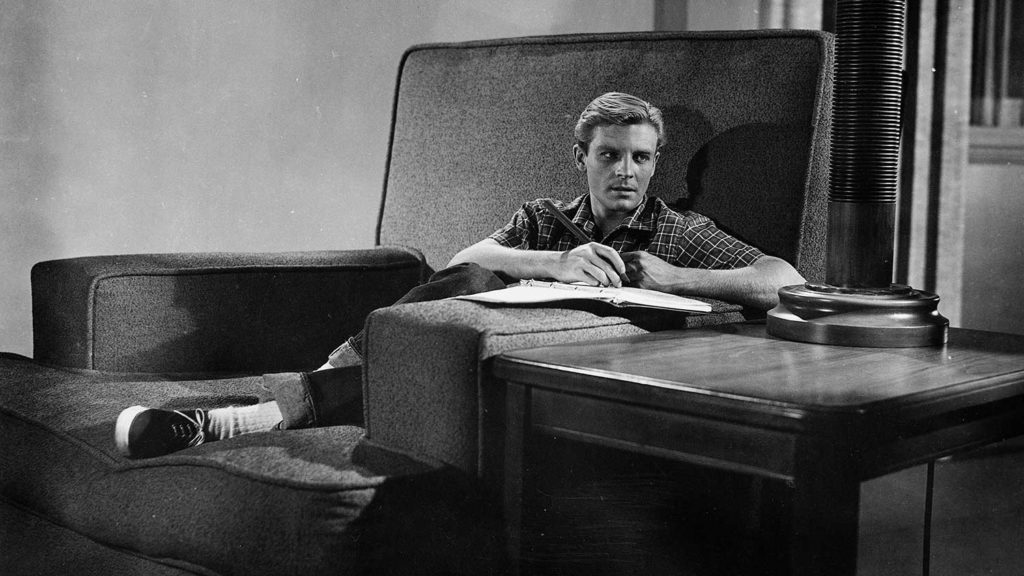
Wednesday, July 6 @ 7:30 PM / NEIU
THE INCREDIBLE SHRINKING MAN
Directed by Jack Arnold • 1957
One day you’re sunning yourself on the deck of a boat with your beautiful wife, the next day you’re fighting off giant spiders with a sewing pin and hiding in a matchbox. Creature-feature master Jack Arnold’s groundbreaking science fiction classic takes the type of punishment normally reserved for mad scientists and places it squarely on the shoulders of an ordinary man. Grant Williams plays Scott, a nice guy with a nice wife named Louise (Randy Stuart), who lives in a nice house, with a nice cat named Butch (who you may recognize, or not, from Breakfast at Tiffany’s). One day Scott gets randomly gassed by a mysterious passing cloud, and several weeks later he notices his clothes don’t fit so well. A trip to the doctor results in a grim diagnosis, “There’s no medical precedent for what’s happening to you.” Scott is shrinking, and over the course of several months he goes from being a normal guy to living in a dollhouse, cowering from his giant wife (try telling her to grab you a beer now, Scott!), and peddling his sad and unbelievable story to the local media for cash. Don’t worry, it gets much worse–let’s not forget about Butch. Jack Arnold’s influential film would go on to inspire more wonderful shrinking cinema such as Joe Dante’s Innerspace, Joel Schumacher’s The Incredible Shrinking Woman (based on the same Richard Matheson novel), and Joe Johnston’s Honey, I Shrunk the Kids. With the current cinema landscape drowning in mind-numbing CGI, it’s an immeasurable pleasure to view the ingenious, deceptively simple, beautiful optical effects and prop work used to create Scott’s giant new world. (RL)
81 min • Universal-International • 35mm from Universal
Preceded by: “World of Pets: Cats” (National Geographic Films, 1985) – 16mm from Chicago Film Society collections
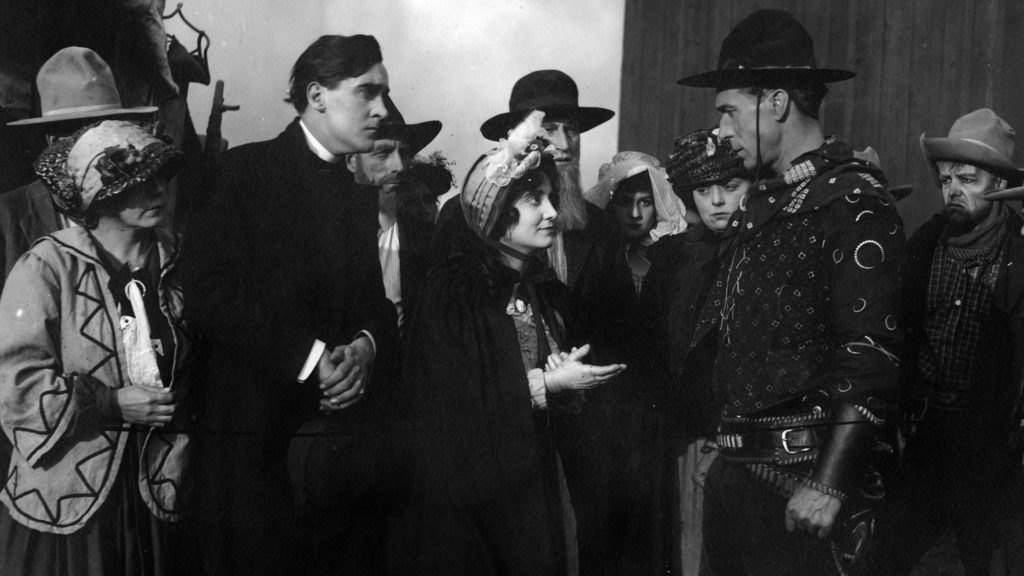
Saturday, July 9 @ 11:30 AM / Music Box Theatre
HELL’S HINGES
Directed by Charles Swickard & William S. Hart • 1916
Westerns of the silent era are often regarded as kiddie stuff, generic action pictures with matinee idols in chaps like Tom Mix, Bronco “Billy” Anderson, and Hoot Gibson. Then there are the Westerns of William S. Hart, a middle-aged moralist of the plains whose films reverberate with a dark evangelical awe. Hell’s Hinges is his masterpiece: a fire-and-brimstone sermon on temptation and degeneration that practically demands a denomination all its own. Hart stars as Blaze Tracy, “a man-killer whose philosophy of life is summed up in the creed ‘Shoot first and do your disputin’ later.’” Tracy maintains an alliance of convenience with the proprietor of Silk Miller’s Palace of Joy, a bordello in Hell’s Hinges, “a devil’s den of iniquity that scorched even the sun-patched soil on which it stood.” It’s the kind of town where a preacher might save a few souls, and so an Eastern priest (Jack Standing) and his aptly named sister Faith (Clara Williams) are dispatched to eradicate sin. But even a man of the cloth is no match for a town yearning for a burning, though Tracy’s liquor-fueled Bible study suggests an unlikely path to salvation. Beautifully photographed by Joseph August and sharply constructed by scenarist C. Gardner Sullivan, Hell’s Hinges plays like a religious tract scrawled in blood on the back of a stagecoach handbill. There is, thankfully, nothing else like it in silent cinema. Preserved by The Museum of Modern Art. (KW)
64 min • Triangle Distributing Corporation • 35mm from the Museum of Modern Art
Live musical accompaniment by Dennis Scott
Preceded by: “The Ruse” (William S. Hart, 1915) – 22 min – 16mm
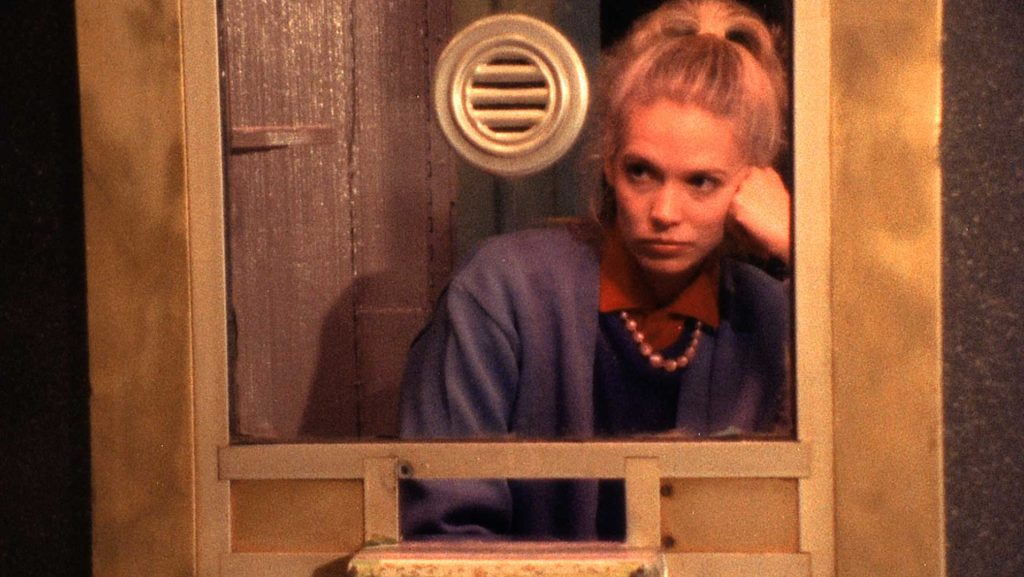
Wednesday, July 13 @ 7:30 PM / NEIU
VARIETY
Directed by Bette Gordon • 1983
A decade after pornography’s high water mark of mainstream acceptance in the early 1970s — when family newspapers accepted advertisements for Deep Throat and middle-aged couples bought tickets to The Devil in Miss Jones to prove they were “with it” — dirty movies were back in the gutter and bereft of friends and advocates. While feminist scholars Andrea Dworkin and Catherine MacKinnon were forming an anti-pornography popular front with the Moral Majority, independent filmmaker Bette Gordon took a more ambivalent and expansive view of the sex industry in Variety, a dreamy tale of empowerment smuggled through the crucible of degradation. Twenty-something city dweller Christine (Sandy McLeod) is behind on rent, so she follows a tip from her gym buddy Nan Goldin (!) and starts working the box office at a porn theater in the heart of Koch-era New York. (The cinema that provides the film’s title and its central location, Variety Photoplays, opened in 1914 and had likewise shifted to adult entertainment by the early ’80s.) After sneaking into the projection booth during a cigarette break, Christine becomes obsessed with the movies, the sex, the clientele, and their inscrutable masculine demimonde. She begins haunting the peepshows and adult bookstores like a gender traitor on a righteous undercover mission. She unnerves her dweeby alt-weekly journalist semi-boyfriend (Will Patton) by reciting kinky monologues and starts stalking one of Variety Photoplays’ mysterio rich guy regulars, a nondescript mafia bagman straight out of Mikey and Nicky, following him to local seafood markets and a carousel in Asbury Park. Gordon’s understated masterwork shows us a secret society of desire hiding in plain sight. (KW)
100 min • Horizon Films • 35mm from Kino Lorber
Preceded by: “Michigan Avenue” (James Benning and Bette Gordon, 1973) – 7 min – 16mm
Preserved by Anthology Film Archives with support from The Andy Warhol Foundation for the Visual Arts and the National Film Preservation Foundation.
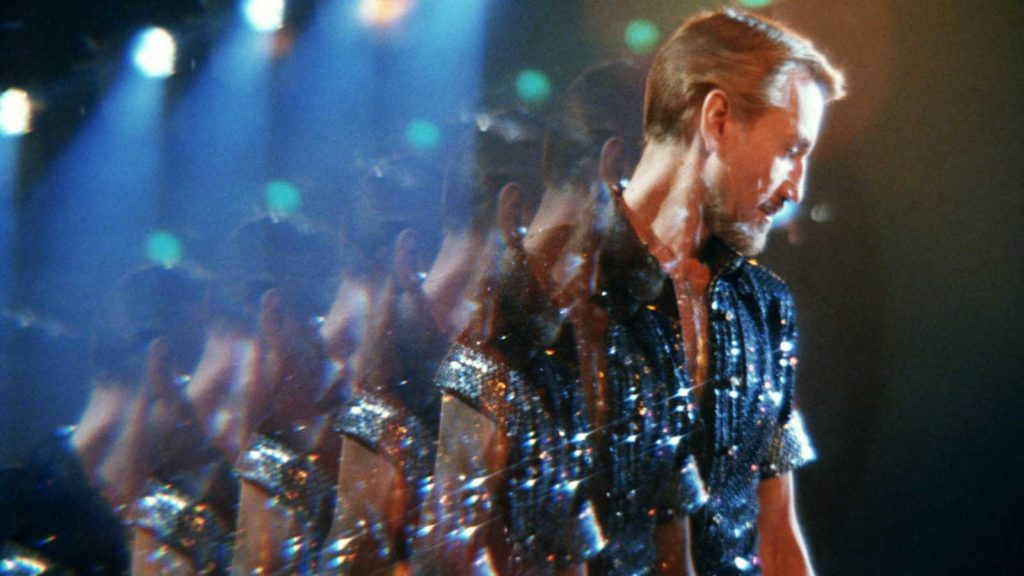
Monday, July 18 @ 7:00 PM / Music Box Theatre
ALL THAT JAZZ
Directed by Bob Fosse • 1979
Winner of the Palme d’Or at the 1980 Cannes film festival, All That Jazz is Bob Fosse’s semi-autobiographical love letter to Broadway, show business, and himself, based on Fosse’s own experiences surrounding his heart attack while working on the Lenny Bruce biopic Lenny and the Broadway production of Chicago. Roy Scheider plays a fictitious version of Bob Fosse named Joe Gideon, a workaholic, sex-crazed director and choreographer who “allowed himself to be adored, but not loved.” Weaving a narrative of Gideon’s work and personal life with incredibly staged fantasy sequences featuring Jessica Lange as the Angel of Death (saved from the chopping block despite the studio’s efforts), All That Jazz fully unlocks the manic power of the motion picture musical and throws away any concern about what that should be. Scheider (whose resemblance to a younger Fosse is downright spooky) got addicted, too, and said he wished the production could go on forever. Though the film is probably most resonant to egomaniacs — Stanley Kubrick once described it as “the best film I think I’ve ever seen” — it is an accurate portrayal of how it feels to be burning the midnight oil even in the most menial part of show business: thrilling and disappointing, life-defining and meaningless, and unexplainably, undeniably important. (JA)
123 min • Columbia Pictures/20th Century Fox • 35mm from Criterion Pictures, USA
Preceded by: Trailer for “Lenny” (Bob Fosse, 1974) – 35mm
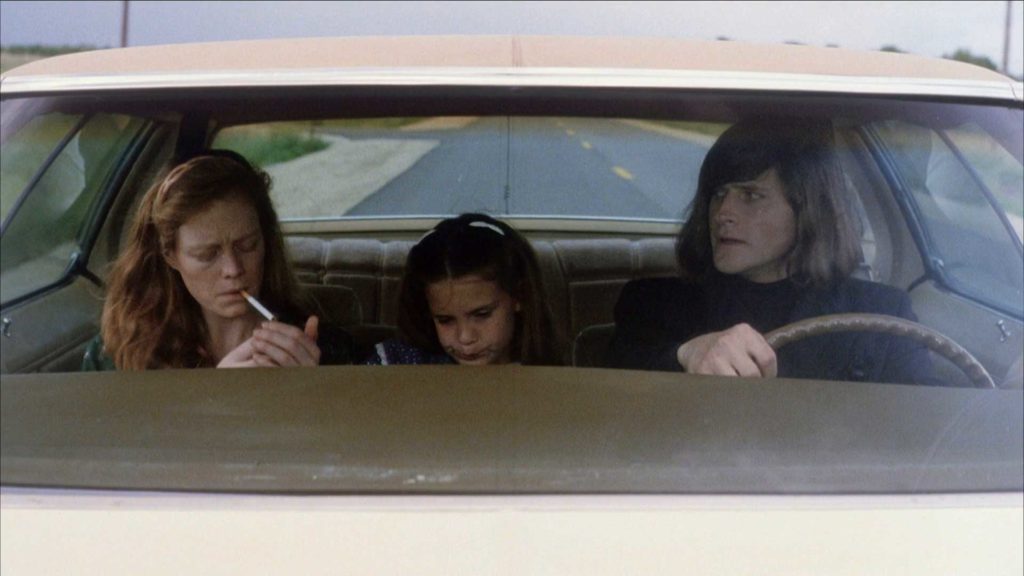
Wednesday, July 20 @ 7:30 PM / NEIU
TWISTER
Directed by Michael Almereyda • 1989
Twister is the first feature film from Michael Almereyda, Pixelvision connoisseur and beloved director of experimental-leaning arthouse titles like Nadja, Tesla, and the 2000 film adaptation of Hamlet. Harry Dean Stanton plays Eugene Cleveland, a soda pop and mini-golf magnate presiding over what appears to be a looney bin in rural Kansas but is actually just his family. As he spends his retirement mulling over potential business ventures (what if cows were tiny?), his aimless children – played by the reliable freakshow Crispin Glover and a routinely pantless and drunk Suzy Amis – hatch a plan to reunite with their long-absent mother. Rounding out this deranged soda pop-swilling (lifetime supply!) clan is Cleveland’s prodigal son-in-law (Dylan McDermott), his fiancée (a local Christian children’s show host), a granddaughter who’s raising herself, and a bemused and competent assistant/maid/chef who should probably quit. Featuring a small role for Jenny Wright, and menacing cameos from Tim Robbins and local Kansan celebrity William Burroughs. Based on Mary Robison’s novel OH! (Robison’s later book Why Did I Ever, about an unhinged Hollywood script doctor, is on CFS’s Recommended Readings list) Twister has an unrelenting narrative and visual weirdness that, much like the family itself, is simultaneously exhausting and comforting. The film had a middling release, likely because the short-lived Vestron Pictures (their eccentric list of titles includes Dirty Dancing and Jackie Kong’s Blood Diner) was verging on bankruptcy by the time Twister was finished, and we’re thrilled to have an original release print in the CFS collection. Stay through the end credits because Crispin crooning “daddy was so mean!” will likely inspire you to pick up his 1988 studio album. (RL)
93 min • Vestron Pictures • 35mm from Chicago Film Society Collections, permission Swank
Preceded by: “The Impact of Television” (Encyclopedia Britannica, 1980) – 22 min – 16mm from Chicago Film Society collections
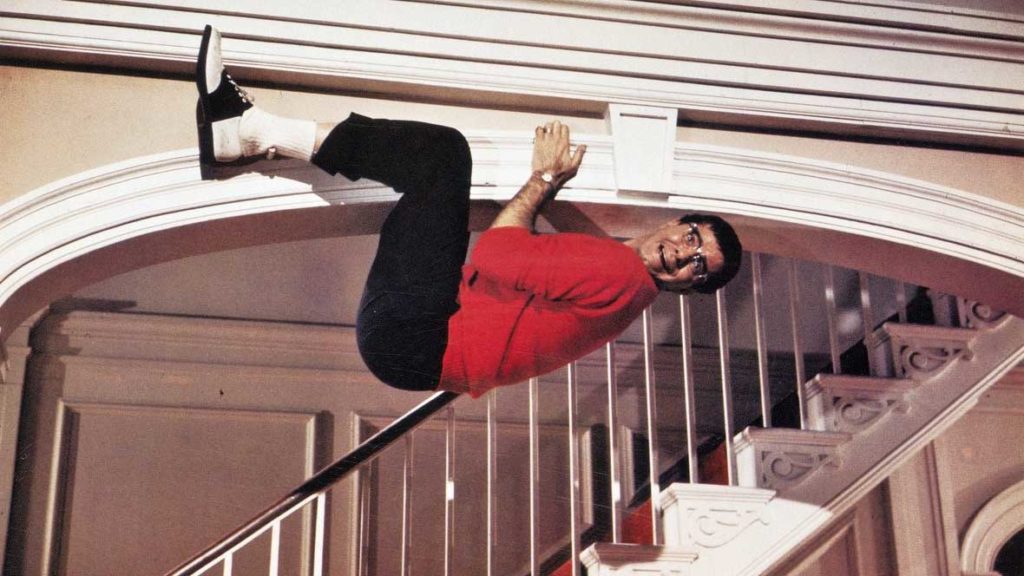
Wednesday, July 27 @ 7:30 PM / NEIU
THE LADIES MAN
Directed by Jerry Lewis • 1961
Some may find it a bit presumptuous that a comedian best known for screeching babytalk cadences and falling on his ass in every scene could lay claim to the honorific “The Total FilmMaker,” but how else to describe the writer/director/producer/star behind a film as formally audacious, technically rigorous, and purely cinematic as Jerry Lewis’s The Ladies Man? Like so many of the movies Lewis directed at the height of his stardom, The Ladies Man has only the scantiest of plots: 35-year-old Herbert Herbert Heebert, excited to enter the world of adulthood after graduating top of his (junior) college class, swears off women forever when he finds out his girlfriend has been unfaithful. Now a committed bachelor, Herbert takes what seems like the perfect job, live-in help at a boarding house run by a pair of kindly older matrons, only to quickly realize he’ll be living alongside the worst thing imaginable: scores of gorgeous young ladies! Lewis dispenses with anything like a character arc for Herbert after the first reel, shooting the remainder of the film as a series of physical comedy set-pieces and elaborate musical production numbers that’ll see the implacably gynophobic Herbert ruining a live television broadcast, tangoing (literally) with George Raft, and facing unknowable horrors inside the house’s forbidden room, all on one of the greatest sets ever constructed in Hollywood: a life-sized dollhouse completely shorn of its fourth wall. (CW)
106 min • Paramount Pictures • 35mm from Chicago Film Society Collections, permission Swank
Preceded by: “The Big Bounce” (Jerry Fairbanks, 1960) – 15 min – 35mm
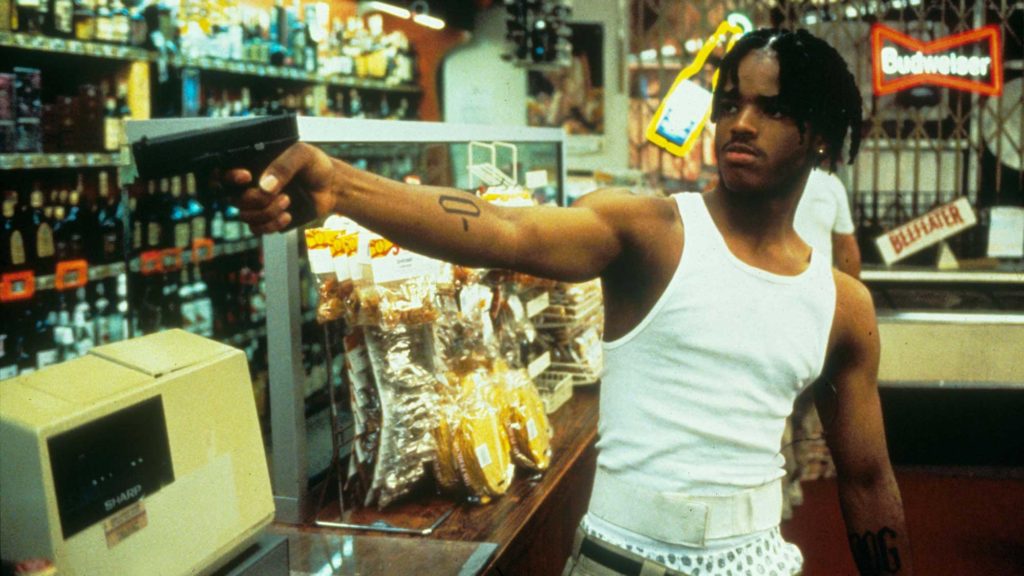
Monday, August 1 @ 7:00 PM / Music Box Theatre
MENACE II SOCIETY
Directed by The Hughes Brothers • 1993
At the age of 20, twin brothers Allen and Albert Hughes became the youngest feature film directors in the history of Hollywood, an auspicious start for a pair of high school dropouts with only a few community college film courses and a couple of rap videos under their belts. The Hughes brothers’ debut Menace II Society follows a pair of teenage crack dealers, recent high school graduate Caine (Tyrin Turner) and his best friend O-Dog (pride of Chicago Larenz Tate, nothing short of iconic here), as they drift aimlessly between parties, hookups, and armed robberies, their lives increasingly punctuated by bloodshed and violent death. Filling out the cast is an absolutely stacked array of memorable supporting players and one-scene wonders including Jada Pinkett (in her first big screen role), Samuel L. Jackson, Bill Duke, Glenn Plummer, Arnold Johnson, and rappers MC Eiht and Too $hort. (Tupac Shakur was also cast but left the production on acrimonious terms. He was later arrested for assaulting Allen Hughes.) Financed as studios were chasing the critical and commercial success of Boyz n the Hood, Menace brought the Hughes brothers instant acclaim for their prowling, Scorsese-influenced style and unflinching treatment of crime and poverty in South Los Angeles, along with condemnations from critics and industry professionals discomfited by their film’s graphic violence and moral ambivalence. Three decades on, Menace’s caustic humor and unsparing worldview remain as shocking as the day the film was released, a touchstone for enfant terribles like Harmony Korine and Chief Keef and perennial inspiration for wayward youth everywhere. (CW)
97 min • New Line Cinema • 35mm from Warner Brothers
Preceded by: Directors’ beef trailer reel – 35mm
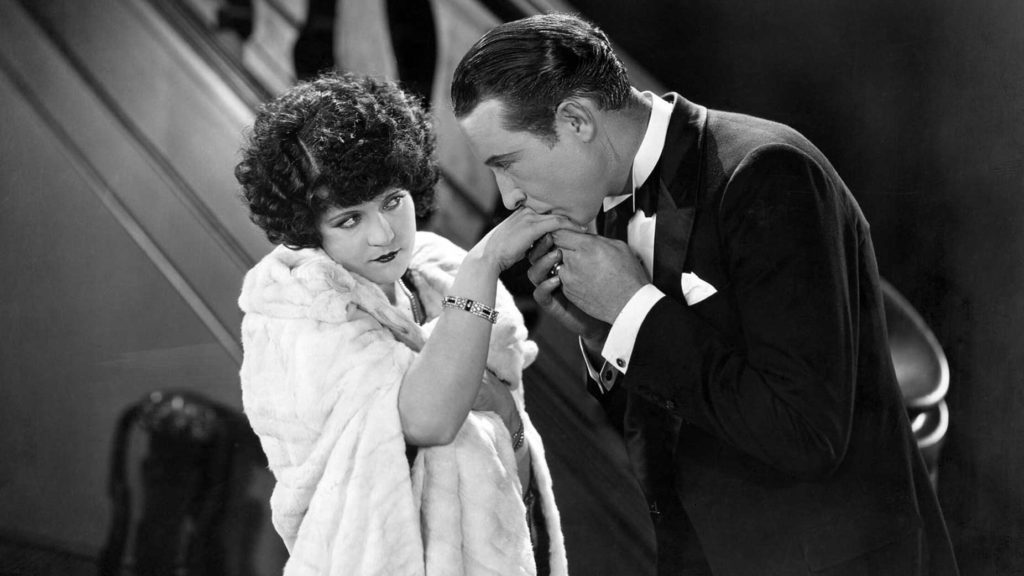
Saturday, August 6 @ 11:30 AM / Music Box Theatre
THE MARRIAGE CIRCLE
Directed by Ernst Lubitsch • 1924
You can take Ernst Lubitsch out of Europe, but you can’t take Europe out of Lubitsch. Even before he emigrated to America, Lubitsch was the rare director whose name meant something to audiences and exhibitors, synonymous with lavish costume pictures that marshaled thousands of extras with geometric precision. Mary Pickford brought him to Hollywood to make that kind of picture for her, but the acrimonious production of Rosita nearly sunk his career. His second American picture, The Marriage Circle, was a strategic reset, a stripped-down chamber piece that set the template for the rest of his career. Set in a contemporary Vienna of workaday decadence, The Marriage Circle follows a quintet of professionals and their wives as they stray and wander back ’round. Professor Stock (Adolphe Menjou) and his wife Mizzi (Marie Prevost) enjoy a relaxed rapport of domestic tranquility, give or take a hole in his socks. But when Mizzi learns her best friend Charlotte (Florence Vidor) has moved to Vienna with her hunky husband (Monte Blue), things become less tranquil and everyone finds themselves up to their ears in romantic entanglements. The result was met with ecstatic industry acclamation. “This picture marks an epoch in film direction,” proclaimed Variety. “It is possibly the first time any director has had the nerve to put a farce comedy on the screen, play it legitimately, and get laughs.” Preserved by The Museum of Modern Art with support from The Film Foundation. (KW)
85 min • Warner Bros. • 35mm from the Museum of Modern Art
Live musical accompaniment by Dennis Scott
Preceded by: tk
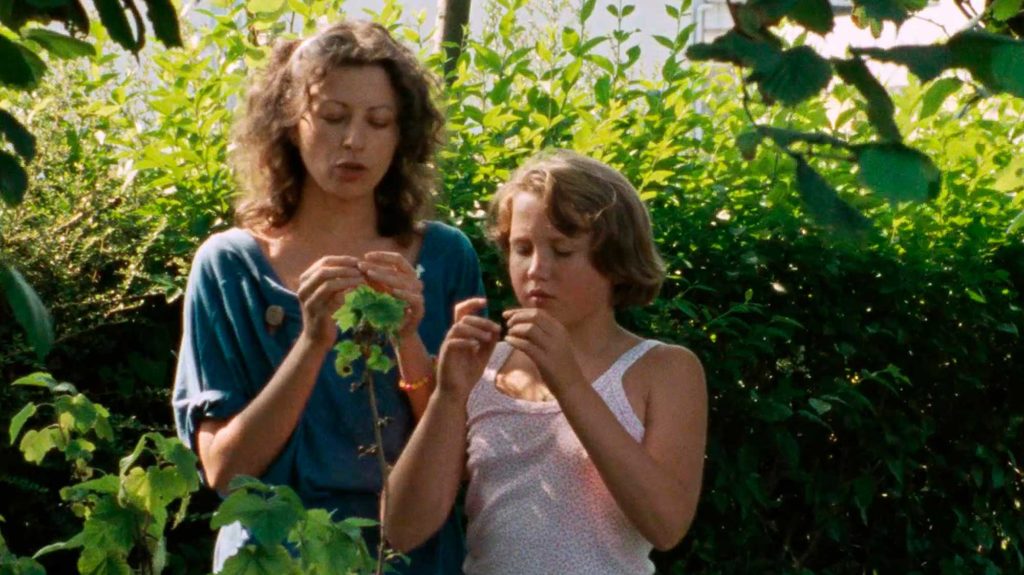
Wednesday, August 10 @ 7:30 PM / NEIU
THE GREEN RAY
Directed by Éric Rohmer • 1986
In French with English subtitles
Delphine is a young secretary with a problem: she has two months of paid vacation time and nobody with whom to spend it. True, she had a fiancé once, maybe, and she might enjoy a week in Cherbourg or Biarritz, if you pressed her, but Delphine’s favorite hobby is disputation and she would surely quibble with the premise. Also: she doesn’t eat meat, she finds your family exhausting, and she would just like some time alone in the woods, all right? But The Green Ray isn’t a case study of depression, or a heart-warming story of a young woman who needed a puppy to revive her soul or some such: it is instead an exuberant and unapologetic act of engagement with the world, a prickly essay on the futility of compromise. A largely improvised fiction structured around uninflected passages from Delphine’s diary, The Green Ray stands as one of Rohmer’s most supple and effortless films, an interior monologue that speaks aloud and often. Its greatest asset is Rohmer axiom and co-author Marie Rivière, whose steely performance as Delphine anchors The Green Ray through each and every scene, a resolute woman drifting through an occult summer. (She’s a Capricorn, which explains everything.) An hour goes by before we learn the meaning of the film’s title, but by then, the alchemical luminance of the 16mm cinematography has already demonstrated that any phenomenon that can be described can also be seen. (KW)
98 min • Les films du losange • 35mm from The Film Desk
Preceded by: “Private Eye Popeye” (Seymour Kneitel, 1954) – 7 min – 16mm from Chicago Film Society Collections
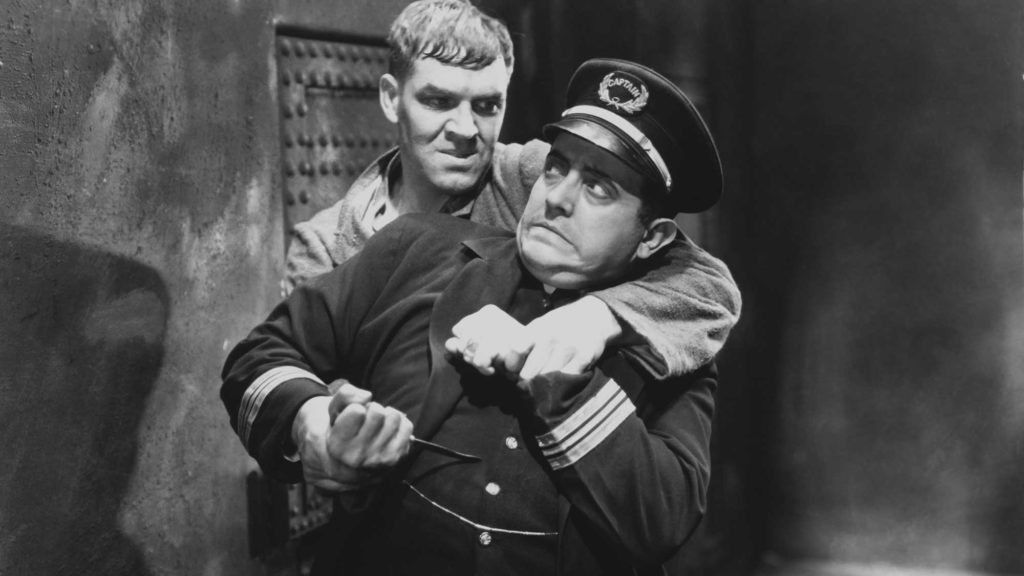
Wednesday, August 17 @ 7:30 PM / NEIU
THE CRIMINAL CODE
Directed by Howard Hawks • 1930
A year into his screen career, Walter Huston had already portrayed Abraham Lincoln under the direction of D.W. Griffith, a capstone moment for any actor that suggested no obvious follow-up. Huston spent the next few years applying the moral authority of the Great Emancipator to the befuddling social upheavals of contemporary America, bringing an Old Testament zeal to such archetypical authority figures as bankers, police chiefs, town marshals, judges, and industrialists. The Criminal Code is an unusually pure example of the genre, with Huston starring as a cynical D.A. who recognizes that the law, often capricious and arbitrary, remains our only bulwark against barbarism. “An eye for an eye,” he proclaims, “That’s the basis and foundation of the criminal code. Somebody’s got to pay!” After a failed gubernatorial campaign, Huston rebounds as the warden of the local prison that’s home to many of the men he sent behind bars. Problem is, the criminal code isn’t just some book of statutes wielded by the law; it’s also the prisoners’ unspoken injunction against snitching and finking. Adapted from a 1929 play by Martin Flavin, The Criminal Code is a hard-edged work of pre-Code cinema, less a sociologist’s prison reform treatise than a snarling, gloves-off tribute to the fragility of law ‘n’ order. Phillips Holmes and Constance Cummings co-star as tomorrow’s Americans, caught in a web of crime, but Boris Karloff easily steals the show as a convict whose parole was yanked away after a single beer. (KW)
97 min • Columbia Pictuers • 35mm from Sony Pictures Repertory
Preceded by: Patsy Kelly in “Pan Handlers” (William H. Terhune, 1936) – 19 min – 16mm from Chicago Film Society Collections
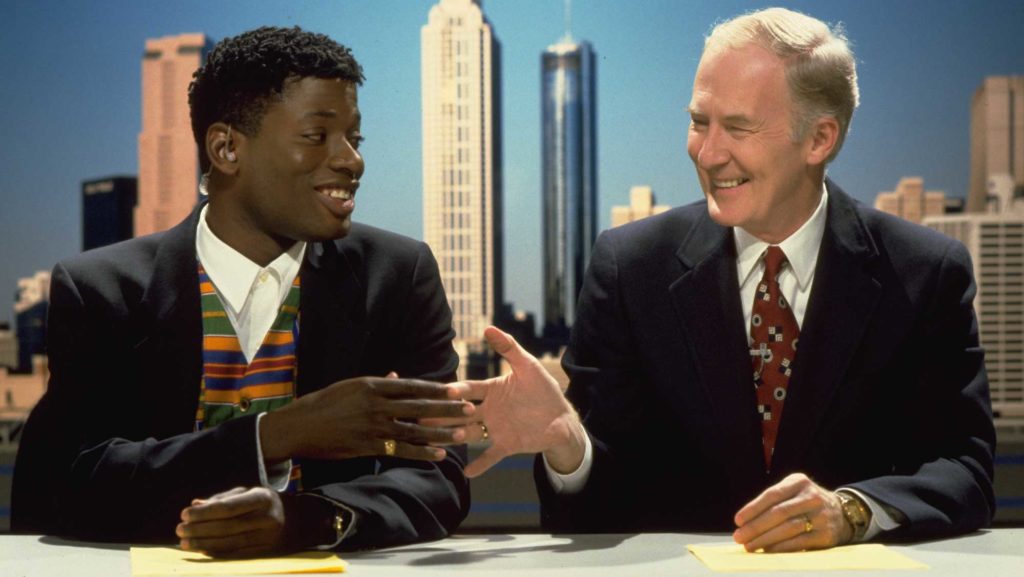
Wednesday, August 24 @ 7:30 PM / NEIU
LIVIN’ LARGE!
Directed by Michael Schultz • 1991
Thirty-something delivery boy Dexter Jackson’s greatest dream is to be a television news anchor, a gig he spends every free moment practicing for. His big break comes during an active hostage situation where he spontaneously takes over for a reporter shot to death on air. Dexter scores an on-camera interview with the gunman and convinces him to stand down, his heroic efforts earning him the respect of his community and a cushy reporting gig as the only Black newsman at a highly rated local network. Soon enough, though, he’s pushed by a craven, ratings-hungry producer to deliver sleazy exposés on his friends and neighbors, and he begins to see a grotesque, Dorian Gray-like transformation in his on-air appearance. Director Michael Schultz (Cooley High) carved out a lane as one of the strongest utility players in ‘70s and ’80s Hollywood cinema, but even though Livin’ Large! followed the occupational comedy formula of previous Schultz canon-entries like Car Wash, Which Way Is Up?, and Disorderlies, box office returns were disappointing and critics proved inexplicably hostile to the film. Schultz’s work has mostly been consigned to TV in the years since, but in hindsight Livin’ Large! looks more like a stepping stone between Sidney Lumet’s Network and Spike Lee’s Bamboozled, a media satire as broad and crass as the industry it’s skewering, and another Schultz-directed winner that pins its wacky hijinks to an uncommon sensitivity regarding matters of race and work. (CW)Rarely revived since its initial release, Livin’ Large! was selected as the most promising title among our recent 35mm acquisitions in a survey of CFS patrons and donors.
96 min • The Samuel Goldwyn Company • 35mm from Chicago Film Society Collections, permission Park Circus
Preceded by: Production featurette for “Sparkle” (Sam O’Steen, 1976) – 8 min – 16mm
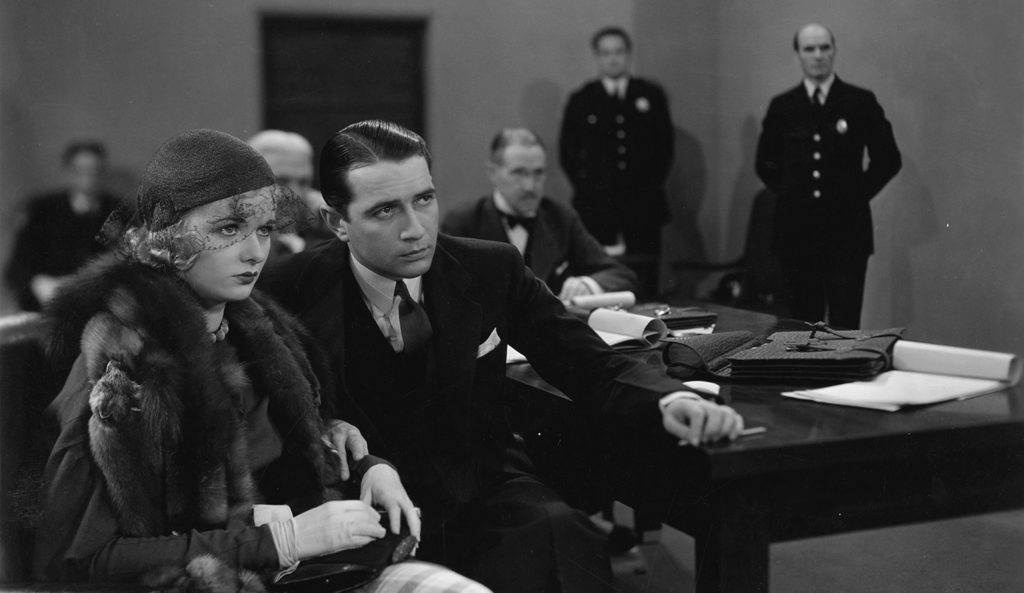
Wednesday, August 31 @ 7:30 PM / NEIU
THE TRIAL OF VIVIENNE WARE
Directed by William K. Howard • 1932
It’s disorder in the court at the case of Vivienne Ware (Joan Bennett), who is on trial for the murder of her two-timing ex-fiancé, architect Damon Fenwick (Jameson Thomas). Knives fly, windows shatter, and guns fire as ZaSu Pitts narrates the proceedings in real time for New York’s gossipy radio audience. Fast-screaming lawyers (including Vivienne’s true love, defense attorney John Sutherland) interrogate dim-witted witnesses, and several flashbacks fill in the gaps. Adapted from a six-night radio serial program which aired on New York’s NBC affiliate WJZ, The Trial of Vivienne Ware combines the nail-biting suspense of radio melodrama with the magic of wackadoo pre-Code film editing. An early contender for the fastest movie ever made, the film contains an astonishing 72 whip pans (by our estimate) in under an hour, and moves so fast you’ll want to watch it a second time. Originally scheduled for April 2020, we’re pleased to present The Trial of Vivienne Ware in honor of WDCB’s Those Were The Days 52nd anniversary and the 50th anniversary of our organization’s predecessor “The Memory Club.” Preserved by The Museum of Modern Art with support from the Celeste Bartos Fund for Film Preservation. (JA)
56 min • Fox • 35mm from the Museum of Modern Art, permission Criterion Pictures, USA
Preceded by: The Three Stooges in “Microphonies” (Edward Bernds, 1945) – 17 min – 16mm
Programmed and Projected by Julian Antos, Becca Hall, Rebecca Lyon, Tavi Veraldi, Kyle Westphal, and Cameron Worden.
Research Associate: Mike Quintero
Heartfelt thanks to:
Shayne Pepper, Cyndi Moran, Robert Ritsema, Ernie Kimlin, Chris Rodriguez, & Jose Aguinaga of Northeastern Illinois University; Brian Andreotti & Ryan Oestreich of the Music Box Theatre; Randy Andrews & Tiffany Greenwood of Swank Motion Pictures; David Antos; James Bond of Full Aperture Systems; Dennis Chong, Jesse Chow, Liam Berney, Jason Jackowski, & Eric Chin of Universal; Chris Chouinard of Park Circus; Amy Crismer of Disney; Andrew Davis; Justin Dennis of Kinora; Olivia Babler, Yasmin Desouki, Julia Lacher, & Nancy Watrous of Chicago Film Archives; Cary Haber of Criterion Pictures, USA; Dave Jennings of Sony Pictures Repertory; Tim Lanza of Cohen Media Group; Steven Lloyd; Jeff Milam of Ecometric Solutions; Seth Mitter of Canyon Cinema; Jake Perlin of The Film Desk; Dennis Scott; Lynanne Schweighofer, Rob Stone, & Mike Mashon of the Library of Congress; Charlie Shackleton; Rob Sevier & Adam Luksetich of The Numero Group; Charlie Shackleton; Tommy José Stathes; Clemence Taillendier of Kino Lorber; Katie Trainor & James Layton of the Museum of Modern Art; and Gabriel Wallace. Particular thanks to CFS research associate Mike Quintero, CFS board members Mimi Brody, Steven Lucy, Brigid Maniates, & Artemis Willis, & CFS advisory board members Brian Block, Lori Felker, & Andy Uhrich.
And extra special thanks to our audience, who make it all possible!

